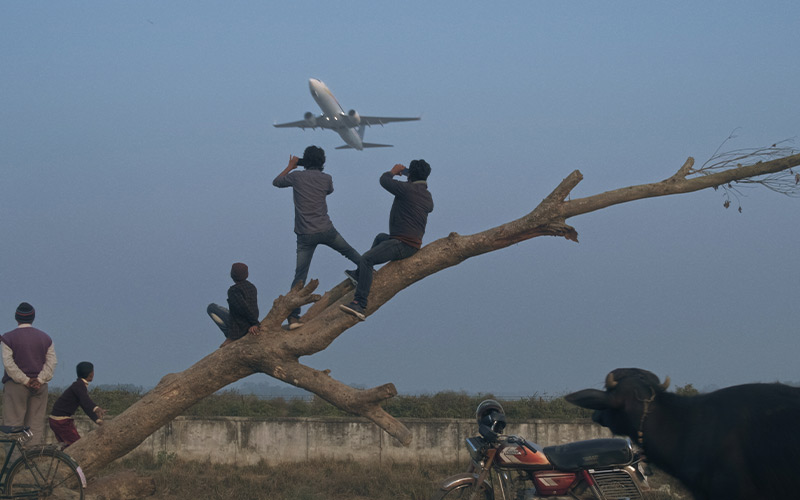Dhuin, a 50-minute feature film set in the small town of Darbhanga in Bihar, directed by Achal Mishra, is about a struggling theatre actor Pankaj (Abhinav Jha), who wants to move to Mumbai to make a name for himself in the film industry. Poised between the elderly parents who want him to earn for the family and friends from the theatre and film circuit who dream of becoming another Pankaj Tripathi, Pankaj is the kernel through whom we see the perils and desires that exist in a provincial town.
Unlike Gamak Ghar (Mishra’s first film), which was rooted in the atmospherics of village life, and where nostalgia was a predominant theme, Dhuin unravels in an urban setting and with polemical intent. One begins to see this development as the film unfolds between the crumbling house of a railway colony, the constant sound of a moving train, and Pankaj’s interior world, where he is constantly trying to escape the constraints of a small town. The melodrama here is genuine and comes to the fore in some of the earlier scenes: from his father’s chastisement for his interest in acting to when he is trying to perfect the “craft” of crying while watching an online video.
In a sequence, Pankaj and his friend ride to a popular spot exterior of the town to take a selfie. Standing atop the bare trunk of a tree, they seem to revel in bringing their acting persona against the aeroplane swishing across the sky. However, as the camera takes a broad frame, alongside the plane and posing duo, you encounter young boys at the frame’s edge on the back of buffaloes. The characters and the landscape come together to create a space where impoverishment and bare life exist alongside an ambitious and prosperous world. And you witness the protagonist’s presence in the middle, caught in between the two worlds.
Dhuin, Like Mishra’s previous film Gamak Ghar, makes a potential use of local actors, locations and social mores to create a cinematic canvas and narrative which has remained chiefly dominated by Mumbai-based productions of Hindi cinema. He also keeps his distance away from the “alternative-trend” of Hindi cinema that utilises the provincial in the name of mega film stars and larger than life stories. His interest in the ordinary helps him craft a visual language situated on the verge of melodrama and realism. The ability to combine the two modes remains the most enigmatic part of his work.
Also read: ‘Gamak Ghar’ and Remembrance of Things Past
Consider this sequence: Pankaj ventures out of the closed university compound to get some cigarettes for his seniors, who wait for him sitting on the university ground. He climbs up the gate to go to the other side and does the same while returning, just to get a couple of cigarettes and hoping that he might learn a few things about cinema in the company of Mumbai returned seniors. The scene is remarkable for the way it has been shot and edited. The climbing scene at the gate does not necessarily take the story forward but instead slows it down to reveal to the audience the contingencies involved in the geography of a provincial town.
In the second part of the sequence, they sit on the university maidan and talk about world cinema and their strategies of surviving in Mumbai. Pankaj, who has just given up his meagre savings to his father and therefore has lost his chance of going to Mumbai, seems unmoved by this discussion. The scene, however, takes a more intensive turn when one of the Mumbai returnees asks him: “Pankaj, Do you think limitations are good for an artist?” His face, lit up by a driving-school car passing by at a constant interval, draws a blank and pithy expression. In the next moment, the camera swiftly moves to the encircling movement of the car itself as if to reveal not only the character’s predicament but also the hidden meaning behind the title of the film Dhuin.

A still from Dhuin.
Though the film’s plot limits itself to a provincial town in Bihar, it also carries an imaginative global leap. Through its constant reference to Abbas Kiarostami, the doyen of Iranian cinema, known for his documentary style of narrative filmmaking, it brings forth a twist that works in many different ways. While on the one hand, it acts as a parody for a provincial figure (Darbhanga ke Kiarostami ho kya tum?), on the other hand, it opens up a door of creative possibilities. We witness the latter in the film’s last scene when Pankaj drives his father on a motorbike to the nearby town for his job interview. Although the long unwinding scene on the highway, with the lush green agricultural landscape in the backdrop, and Tajdar Junaid’s minimalist but soulful music, bring closure to the film, the characters and their life journeys continue to grow in your imagination.
The scene may remind one of Kiarostami’s Close-Up, but it has its own place in the film’s narrative. It complicates the formula of a conventional cinema where the end brings results. Instead, the film’s form creates an appeal by being anti-story in its approach and offers you the little details of an actor’s life and surroundings from a provincial town in Bihar. What, however, remains striking is the glaring absence of women characters in the film. There is only one woman character (Asha Ram) with a static presence in just a couple of scenes. One wonders how the reverse of it would have shaped the film.
Nevertheless, the film marks a critical moment in Indian cinema. The emergence of stories from small provincial centres of the country is not only making cinema more democratic; it is also challenging the established templates in which they have been thought until now. These films (one may also recall here, Udaan by Vikramaditya Motwane) give visibility to those ordinary spaces and experiences that otherwise get lost in the grandeur of metropolitan concerns. A film like Dhuin challenges the often repeated motif of Bihar as a place of crime or violence or Darbhanga as still wrapped in the cloak of feudal Darbhanga Raj. It points out that, despite poverty and desolation, art, literature, music and morals still matter here – like anyplace else.
Dhuin premiered at the Jio Mami Mumbai Film Festival 2022 in the India Gold Section.
Akash Bharadwaj is a PhD researcher with the department of History at Shiv Nadar University.
Featured image: Achalchitra Productions

